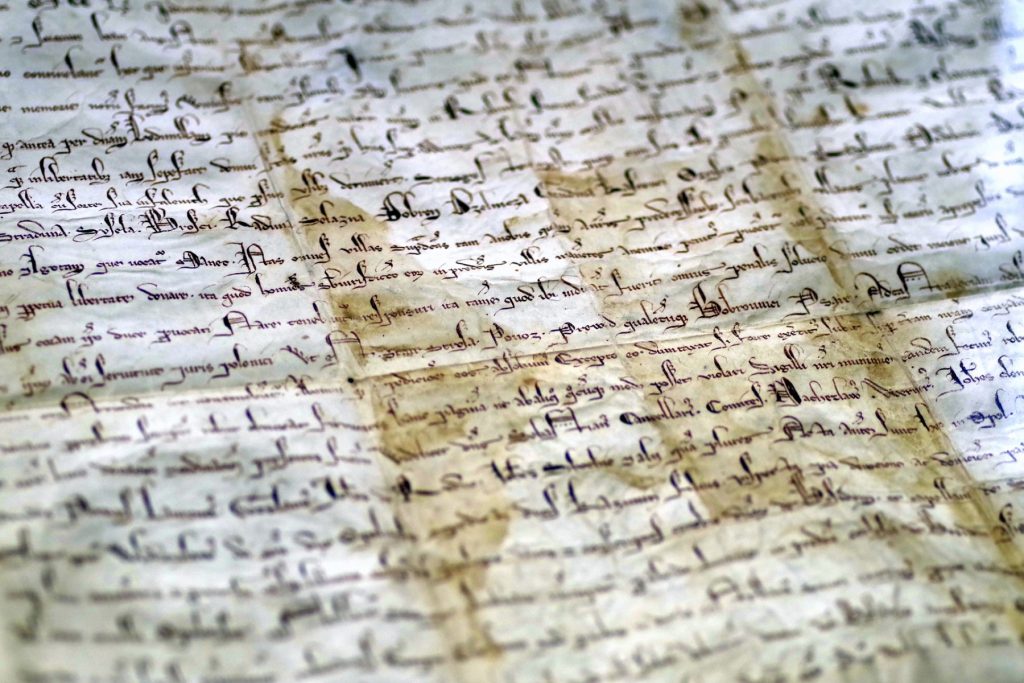Doers of the Word
Oct 31, 2021
A Prayer in a Pocket
He arrived at Auschwitz with a manuscript in his pocket. The prison guards forced him to remove his clothing and turn everything over, including his book. Then they forced him to put on the clothing of a man who had just been murdered at the camp.
In the pocket of the dead man’s clothing was the Shema scrawled on a piece of paper. The Shema is the most important prayer in Judaism found in Deuteronomy 6:4-9, in todays first reading. “Hear, O Israel. The Lord our God, the Lord is one.” The prayer summarizes the Jewish belief that there is only one God. The Shema is said at Sabbath services in synagogues, as well as on holidays. We Catholics pray the Credo on Sundays and Holy days.
It was this prayer in a pocket that helped Viktor Frankl survive the Holocaust. He wrote, “Instead of the many pages of my manuscript, I found in a pocket of the newly acquired coat one single page torn out of a Hebrew prayer book, containing the most important Jewish prayer, Shema Yisrael. How should I have interpreted such a ‘coincidence’ other than as a challenge to live my thoughts instead of merely putting them on paper.”
Later in life, Frankl became a psychiatrist renowned for developing a therapeutic technique known as Logotherapy. It is based on the idea that human suffering is more bearable if some kind of purpose can be ascribed to it.
Fast forward: a fall on a slippery thin slice of ice on a wooden ramp at 5:30 on a Monday morning. Two days earlier we celebrated the Feast of the Guardian Angels, those celestial beings whose mission is to protect us. So, we were taught. Can I say the celestial being fell with me? I need to preserve their protective mission. My faith in angels was preserved. On the cross Jesus cried out to His Heavenly Father. He was heard. His Father never left Him.
A prayer in a pocket, a call from the cross, a call from a fallen monk, can penetrate the mystery of suffering and all will be well again.
Hacedores de la Palabra
31 de octubre de 2021
Una oración en un bolsillo
Llegó a Auschwitz con un manuscrito en el bolsillo. Los guardias de
la prisión lo obligaron a quitarse la ropa y darle la vuelta a todo, incluido su libro. Luego lo obligaron a ponerse la ropa de un hombre que acababa de ser asesinado en el campamento.
En el bolsillo de la ropa del muerto estaba el Shemá garabateado en un papel. El Shemá es la oración más importante del judaísmo que se encuentra en Deuteronomio 6: 4-9, en la primera lectura de hoy. “Escucha, Israel. El Señor nuestro Dios, el Señor uno es ”. La oración resume la creencia judía de que hay un solo Dios. El Shemá se dice en los servicios del sábado en las sinagogas, así como en los días festivos. Los católicos rezamos el Credo los domingos y días santos.
Fue esta oración en un bolsillo lo que ayudó a Viktor Frankl a sobrevivir al Holocausto. Escribió: “En lugar de las muchas páginas de mi manuscrito, encontré en un bolsillo del abrigo recién adquirido una sola página arrancada de un libro de oraciones hebreo, que contiene la oración judía
más importante, Shemá Israel. ¿Cómo debería haber interpretado semejante ‘coincidencia’ si no fuera como un desafío para vivir mis pensamientos en lugar de simplemente plasmarlos en un papel?
Más adelante en la vida, Frankl se convirtió en un psiquiatra reconocido por desarrollar una técnica terapéutica conocida como Logoterapia. Se basa en la idea de que el sufrimiento humano es más llevadero si se le puede atribuir algún tipo de finalidad.
Avance rápido: una caída sobre un delgado y resbaladizo trozo de hielo en una rampa de madera un lunes por la mañana. Dos días antes celebramos la Fiesta de los Ángeles Guardianes, esos seres celestiales cuya misión es protegernos. Entonces, nos enseñaron. ¿Puedo decir que el ser celestial cayó conmigo? Necesito preservar su misión protectora. Mi fe en los ángeles fue preservada. En la cruz, Jesús clamó a Su Padre Celestial. Fue escuchado. Su Padre nunca lo dejó.
Una oración en el bolsillo, una llamada de la cruz, una llamada de un monje caído, pueden penetrar el misterio del sufrimiento y todo volverá a estar bien.

